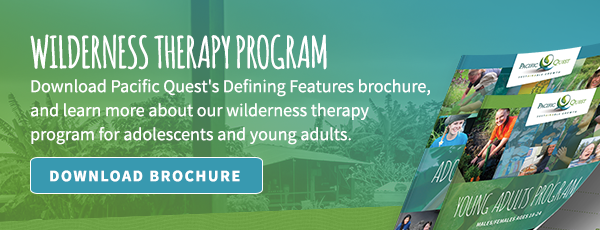The seasons are a powerful force; they affect all human beings—our behaviors, choices and even moods. The reasons behind this are science-based; greater exposure to sunlight, has been found to decrease melatonin production and increase dopamine release, lessening our urge to sleep and brightening our outlook on life.
“The beautiful spring came; and when Nature resumes her loveliness, the human soul is apt to revive also.” -Harriet Ann Jacobs
With a little boost from Mother Nature, spring is the optimal time to consider enrolling a depressed teen in a Horticultural Therapy program. It’s a time for rejuvenation and fresh starts, and it begins March 19.
Horticultural Therapy at Pacific Quest
Pacific Quest’s program parallels the stages of growth and change natural to mother earth. The garden is our classroom, and its natural wonders teach students life skills that are easily transferable in all aspects of life. This experiential environment is life-affirming and pairs well with a clinical treatment plan that seeks to motivate and inspire positive change. From promoting a healthy lifestyle to creating a true sense of purpose, Horticultural Therapy can benefit most teens and young adults struggling with depression.
A Budding Healthy Lifestyle
Horticultural Therapy puts students in direct contact with the food they eat. By planting, growing and gathering their own crops, students learn the importance of organic, whole foods that come from the earth. Simultaneously, students engage in moderate physical activity outdoors (both structured and unstructured) and end the day with a full night’s sleep. This daily schedule has a significant impact on mental well-being and has been proven to help reduce symptoms of depression.
A Growing Purpose
As students develop their routine, a growing sense of purpose naturally develops within. By working together in the garden, students develop the positive feelings of being able to give back something valuable to someone who has given something to them (reciprocity), building self-esteem and self-worth. It’s lessons like these, learned in a Horticultural Therapy program, that transfer to real life and make an impact long after spring has faded into summer, fall and winter.
A Blossoming New Outlook
Practical coping skills that teens can stick to provide the foundation for a new outlook on life and what it means to each individual. Depression is a serious illness that should be treated with proven, effective methods. Horticultural Therapy has been documented as a successful method for treating depression, anxiety and trauma since the dawn of humanity. Egyptian pharaohs were prescribed daily nature strolls to treat mood instability, and Greek philosophers preferred green, lush gardens as their classrooms for teaching meaningful life lessons. Going back to basics helps depressed teens see themselves, and the world around them, in a fresh way. Students who participate in a spring Horticultural Therapy program plant the seeds of recovery that will blossom and serve them all year long.
For more information on Pacific Quest’s Horticultural Therapy programs, and how we treat teen depression, download our free brochure today.
